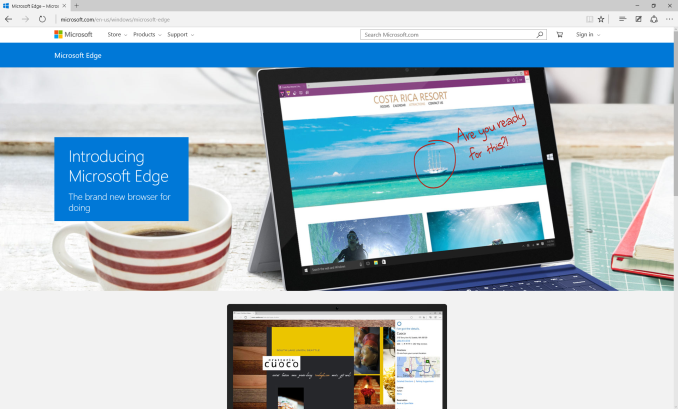Examining Microsoft Edge Browser Performance
by Brett Howse on July 21, 2015 3:30 PM EST- Posted in
- Software
- Browsers
- Microsoft Edge

In what seems like forever ago, Microsoft’s Project Spartan was announced at the January 21st event in Redmond. This project kept the same rendering engine, Trident, and ECMAScript (JavaScript) engine, Chakra, as Internet Explorer, but stripped out much of the old code for backwards compatibility and moved forward with a push towards better performance and web standards support. I took a look at the performance of Project Spartan back in January when it could be enabled inside of Internet Explorer. The performance jump from Internet Explorer was extremely large, which was a good indication of what was to come.
Moving forward, Project Spartan got a name in Microsoft Edge back at Build. Over the last several months, Microsoft has put out quite a bit of information on the new features they are adding to Edge over on the Microsoft Edge Dev Blog including support for the latest ECMAScript standards, asm.js, SIMD support, and much more, all in an effort to bring their browser up to par for the modern web. It is likely not a surprise to many that Internet Explorer has had a tremendously long development cycle, especially compared to browsers like Chrome, and now Firefox, which are updated almost continuously. Some of that was due to the reliance of old features which were used in businesses, and Microsoft’s strong adoption in the enterprise has certainly held them back when it comes to large scale changes to the browser. Internet Explorer will be sticking around for those who need it (for example if you need ActiveX Controls on your page) but for the rest of Windows users, Microsoft Edge will now be the new default browser out of the box.
I’ve gone over some of this in the past, but it is likely worth a refresher anyway. Edge is bringing some new features such as integrated Cortana support built right into the browser to offer contextual search within a web page, or to offer answers to questions right in the address bar. It will also have support for annotation of web pages using a pen, mouse, or touch, and annotated pages can easily be shared. It has a reading view, a reading list, and while not available next week when Windows 10 ships, it will be gaining extension support very similar to Google Chrome to add even more functionality to the browser. This, combined with better web standards support, and a much quicker update cadence (this will have to be proven by Microsoft after release, but they have committed to quicker updates of Edge through the Windows Store) should result in a much better browsing experience than was available in Internet Explorer. If you have already switched from IE to Chrome, Firefox, or another browser, it may not be enough to sway you back – especially without extension support at launch – but it is at least worth a look. I’ll get more into my takes on Edge in our Windows 10 review.
For now, what we can examine is browser performance, not only because it is important, but because Microsoft has been making a lot of statements about improved performance of Edge as recently as last week when Windows 10 Build 10240 was released. When a company says a product is “blazing fast” it is a good idea to check it out to see if it actually lives up to that performance level.
Luckily I did run numbers in January on my desktop which features an Intel Core i7-860 processor. None of the hardware has changed, so I decided to re-run the tests with the latest version of all of the browsers. I kept the original numbers for IE 11, but I did re-run the tests to verify that they did not change.
| Browser Performance - Core i7-860 | |||||||
| Benchmark | IE 11 (Jan) | Spartan (Jan) | Edge 20 (July) | Chrome 40 (Jan) | Chrome 43 (July) | Firefox 35 (Jan) | Firefox 39 (July) |
| Sunspider (lower is better) | 149.7ms | 144.6ms | 133.4ms | 260.9ms | 247.5ms | 220.1ms | 234.6ms |
| Octane 2.0 (higher is better) | 9861 | 17928 | 22278 | 17474 | 19407 | 16508 | 19012 |
| Kraken 1.1 (lower is better) | 3781.2ms | 2077.5ms | 1797.9ms | 1992.8ms | 1618.7ms | 1760.4ms | 1645.5ms |
| WebXPRT (higher is better) | 913 | 1083 | 1132 | 1251 | 1443 | 1345 | 1529 |
| Oort Online (higher is better) | 1990 | 2170 | 5470 | 5370 | 7620 | 3900 | 7670* |
| HTML5Test (higher is better) | 339 | 344 | 402 | 511 | 526 | 449 | 467 |
In every single instance, Microsoft Edge outperformed Project Spartan from back in January which is a good sign. It is the quickest browser in Google’s Octane 2.0 benchmark, and by a good margin. It is still the slowest in WebXPRT 2013 though. One of the biggest improvements though was the WebGL performance in the Oort Online benchmark, which went from terrible to good.
The other browsers have not been sitting idle though, and in that time they have also made gains in their performance. But the story is still a good one for Edge. It really is right up there with the rest of the browsers in terms of performance. It is quicker in some workloads, and slower in others, but generally performance should not be an issue. It still falls behind in the HTML5 test, but it has made big improvements there as well.
One thing that did pop out though is how much of a gain Firefox made in the WebGL test. Firefox went from middle of the pack to leading in the overall score, but if you noticed in the table I had to put an asterisk beside its score. The performance was quite good, but it achieved this performance by not rendering the scene correctly at all which contributed to its high score. In Oort Online’s benchmark, there is a snow scene, which Firefox rendered as blinking lights, and a rain scene, which was rendered as a couple of horizontal lines as seen in this screenshot.
Firefox Rain Rendering (Incorrect)
Edge Rain Rendering (Correct)
It is great to see Microsoft focusing on browser performance again, and especially not sitting idle since January, since the competition in this space has not been idle either. Only time will tell how Edge holds up over time, and if it continues to receive updates on a quicker cadence, but considering it is already at version 20.10240.16384.0, it does appear that Microsoft has jumped on the rapid release cycle with regards to their browser, which will only help them moving forward.













86 Comments
View All Comments
lilmoe - Tuesday, July 21, 2015 - link
1) IE has been the smoothest hardware accelerated browser, and has consumed less CPU/GPU % than all others in my usage.2) Stability? Are you sure you're talking about IE? It has been the most stable browser for me. Firefox crashes like crazy (standard and dev versions), and Chrome crashes less but most definitely more than IE.
3) RAM usage, lol. IE is well known to be the better out of the three in memory usage, Chrome being worst by a wide margin.
4) Edge is not IE, nor does it use the same browser engine as IE.
Easy there dude, you're coming out as a troll...
Wolfpup - Tuesday, July 21, 2015 - link
I don't have any stability issues with Firefox (nor with IE). Are you running extensions? I've heard of people running 90 extensions, having horrible stability, and then blaming it on the browser.Michael Bay - Wednesday, July 22, 2015 - link
Well, I only use adblock and Firefox likes to crash from time to time.qlum - Wednesday, July 22, 2015 - link
I would switch to μblock as adblock plus / edge are a real memory hog especially on firefox, they are the prime reason for browser crashes in my experience.lilmoe - Wednesday, July 22, 2015 - link
Only uBlock. Not sure if it's because that one extension, but some sites crash during scrolling and others crash just when opening them... It's less frequent now, but definitely once or twice every day.Deo Domuique - Wednesday, July 22, 2015 - link
lol... It's like I wrote this message. Indeed, ΙΕ has the best GPU acceleration implementation. Much less CPU/GPU resources for everything (the most important), rendering, video etc. The most efficient browser out there. And yes, right now something is different between IE11 and Edge on Win 10. I'm sticking with IE11, though, because Ad block Plus is working greatly right now. When Edge will get it, I'do the jump in a sec.Wolfpup - Tuesday, July 21, 2015 - link
I don't use IE as my primary browser, but I really don't see stability issues with any browser. RAM usage, well, web pages now take up a ton of RAM (and CPU) and the real solution is to get a big enough PC.althaz - Tuesday, July 21, 2015 - link
Have you ever used a browser outside of the one you use now?Stability has not historically been a problem with IE and Edge remains rock-solid. Certainly more stable than Firefox (which I'm writing this post in). It's also much, MUCH better in terms of power efficiency, so you can get pretty massive battery life improvements from running Edge (or IE) instead of say, Chrome (the browser I use the most). Edge also uses a *lot* less RAM than Chrome does, but so does basically everything - however who cares about RAM usage? If you aren't running out of RAM, then it's utterly irrelevant.
Overall, I still rate Chrome at #1 (and Firefox 2nd), but Edge is comparable with performance and is more power-efficient (important for mobile devices). It's a very good foundation...but I don't think the browser is ready yet. Lots of small things I've grown used to simply don't exist in Edge yet. Drag a tab to another monitor? Nope. Adblocker? Nope. About 200 other things missing that are too small to list but too irritating to live with? Yes.
I'm confident Edge will grow into an excellent browser...but it's not there yet.
Bobs_Your_Uncle - Thursday, July 23, 2015 - link
Well ... as you note, the article's title uses the term "Examining". It doesn't claim to be a deep dive, or a comprehensive review. And Edge is still "officially" in Beta.Sure, they might have billed this as a "Brief Overview" or a "High Level Look" at Edge, but they ran with "Examining". Ultimately, of course, it is what it is.
So clearly, intimations of graft & paid promotion are fully warranted! (It's exactly where I'd go, immediately AFTER declaring my unwavering commitment to ethics in gaming journalism.)
Bobs_Your_Uncle - Thursday, July 23, 2015 - link
My comment (above ... maybe?) was a reply to jj who, on Tuesday, July 21, 2015, wrote: "LOL you call that examining the performance?Even when you test one app, you can't actually test the app?
And that;'s without factoring in power, stability, RAM usage and a lot more. IE's biggest problem was stability.
Have they payed for you to not actually test it ?
I don't get the comment sequencing (so yeah, someone HAS to on the take & the scandal is much larger than I'd ever imagined)!